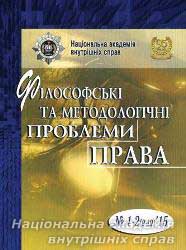Transparency of Modern Judicial Power
Keywords:
court, the judiciary, transparency, openness, hlasnyst, media, modernity
Abstract
This article is devoted to the unexplored aspects of modern judiciary. Transparency and openness in the field of judiciary have not been the subject of philosophical and legal interest until now. It is proved that all kinds of openness of judicial activities is a requirement of specification of еру principle of publicity of all social life, as opposed to the principle of privacy. This article substantiates three main forms of transparency in the judiciary. Publicity of modern judiciary understood as expression common cultural attitudes today. The author emphasizes that public and private areas are conquested by modern European culture. Today the scope of publicity – is one aspect of a feeling of «homelessness». As we are witnessing a process of colonization of life world, communications each of us in touch of public area. Under judicial transparency we understood such level of organization of the judiciary in the society in which citizens ensured free access to court proceedings, justice, the formation of the judicial corps. The judiciary and its operation is no exception, and therefore the court transparency, openness of trials and access to court information ranks among the political and legal values of the modern world.Downloads
Download data is not yet available.
Abstract views: 278 PDF Downloads: 527
Issue
Section
Philosophical problems of particular branches of law studies
Copyright (c) 2017 Philosophical and Methodological Problems of Law

This work is licensed under a Creative Commons Attribution-NonCommercial-NoDerivatives 4.0 International License.
- Authors reserve the right to authorship of their own work and transfer to the magazine the right of the first publication of this work under the terms of the Creative Commons Attribution License, which allows other persons to freely distribute published work with mandatory reference to authors of the original work and the first publication of an article in this magazine.
- Authors have the right to enter into separate additional agreements on non-exclusive dissemination of the work in the form in which it was published in the journal (for example, to post an article in the institution's repository or to publish as part of a monograph), provided that the link to the first publication of the work in this journal is maintained.
- The journal's policy allows and encourages the posting of articles by authors on the Internet (for example, in electronic storehouses of institutions or on personal websites), both before the submission of this manuscript to the editorial office and during its editorial processing, as this contributes to the creation of a productive scientific discussion and positively affects the efficiency and dynamics of citing the published work.




